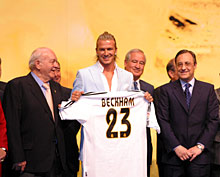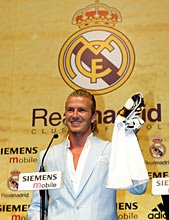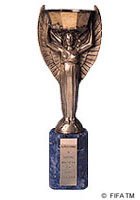 "Welcome to the 2006 FIFA World Cup Germany™"
"Welcome to the 2006 FIFA World Cup Germany™"Seventeen years after the fall of the Berlin wall, a reunified Germany will throw open its doors to the world. Germany 2006 will be a place where people from all around the world will be welcomed by friends, in the spirit of the striking slogan chosen by the organisers: Die Welt zu Gast bei Freunden.
The tournament is being held on the finest stage in the world, one whose symbolism far transcends the boundaries of sport. Hark back to Germany’s triumph at the 1954 FIFA World Cup in Switzerland, which sealed the country’s return to the international fold in the most beautiful manner possible.
In 2006, Germans will have the opportunity to rectify certain clichés and preconceived ideas. The world will have the chance to see what a fantastic country Germany truly is: the beauty and diversity of its landscapes, its rich cultural heritage and the intelligence and good humour of its people.
As for the legendary German work ethic and organisational skills, I am pleased to say those perennial qualities are alive and well - and we at FIFA are only too happy to take advantage of them.
For at all levels, the overall investment in any World Cup tournament is immense. The event is financially supported by the German state, but also by the “Länder” and the Host Cities. I would like to take this opportunity to offer my heartfelt thanks to all those who are currently working with such passion and commitment to make the occasion a memorable one.
Today’s efforts will bear fruit tomorrow. German football, for example, will boast twelve spanking new or vastly improved stadiums in 2006. The whole German population too will benefit in terms of better transport and reception infrastructures.
Football clubs, schools and people all over the land have really got behind this great event, providing further proof, if any were needed, of the prominent role football plays in all our lives. In this respect I would like to congratulate the German Football Association for inviting people from all walks of live to take part in this great event.
Needless to say, none of this comes as a surprise and I am well aware of the loyalty of the Deutscher Fussball-Bund* and its President, my good friend Gerhard Mayer-Vorfelder. They enjoy my complete confidence in their ability to organise a tournament every bit as good as in 1974.
Like Mexico, Italy and France, Germany is now organising its second FIFA World Cup. The first saw the great Franz Beckenbauer lift the trophy as captain of the winning team. Today, he presides over the Local Organising Committee in the run-up to a tournament which has changed considerably down the years: back in 1974, only sixteen sides took part, including the now-defunct German Democratic Republic (GDR) and Zaire. The latter were the only representative from the African continent and conceded fourteen goals with no reply.
The 2006 tournament will be a vastly different affair. Thirty-two teams will have qualified, including five from Africa, all of whom now perform at a far higher level. Just remember how Senegal upset the odds in Korea and Japan in 2002. The same can be said for Asian teams, who produced a semi-finalist last year, something which would have been unthinkable back in 1974!
These performances bear witness to FIFA’s efforts in the last quarter of a century to help the nations of the football world to compete on an equal footing. I will have the immense pleasure of welcoming you amongst my friends in Germany. We look forward to seeing you in 2006 to celebrate this unity!
Joseph S. BlatterFIFA President






















